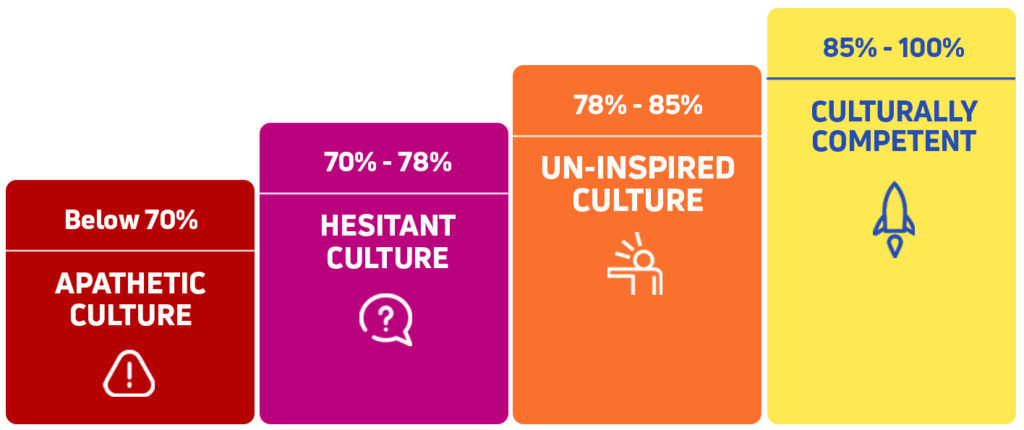
Culture Quiz Results

Quiz Analysis & Recommended Next Steps
Congratulations!
Your organizational and internal culture empowers you to speak up and your input and ideas are perceived as valuable and respected. Even when it’s necessary to have an uncomfortable conversation, you trust that ultimately, speaking up is important to building a thriving culture. This trust helps you move through the discomfort of managing differences with more ease and less stress. Your culture values mutual respect and appreciates the diversity each individual contributor brings to the table, even without agreement. Expectations are typically clear and performance is discussed regularly, in neutral, non judgmental ways. There’s an openness to new ideas and innovation. You most likely feel fully utilized and professionally challenged to be your best. Congratulations, you are winning at work.
Next Steps:
Share a short story or reason that captures why your company is a great place to work. You may even get featured on our blog. We love celebrating individuals and organizations that work together to have a great company culture.
Generally, a result in this range means you are enjoying the work you are doing, feel utilized and are comfortable taking risks to change the culture. You lean more towards avoiding blaming others or the organization for what is not working.
Your culture is better than most but there’s still work to do. People are appreciated and rewarded for their work but a lack of full disclosure regarding company vitals and behind the scene information, hinders growth and productivity. Under-utilized employees, and teams tend to get distracted easily and drain resources and energy. People feel respected for their skills, but limited because the pathways for growth within the organization are undefined. The organization is achieving their goals but there’s a general “same old thing” feeling about it all. The work challenges could be described as draining rather than creative. People long for the fire they remember feeling when they joined the organization.
Next Steps:
You have a lot to offer your organization. You have the opportunity to become a more deliberate asset and less of “an observer” of what goes on. Find opportunities to be a visible leader. Be very clear about what you know can be improved and refined with the resources at hand. Write down your thoughts, what you see and observe, and decide when the best times are to insert your point of view, and enthusiasm for progress. Be prepared with specifics versus generalities. This will be a great stretch for you on the path to becoming an authentic leader.
You want to contribute much more to your organization but there is some hesitation given your experience with, and perception of, the organizational culture. This “hesitant” mindset introduces an element of doubt, which can undermine your success. You may have also inadvertently adopted the culture’s mindset of “I’ll try.” “I’ll try” is an escape clause to under utilize one’s accountability capacity ahead of time. It tends to give an individual permission to externalize blame or to be resolved with “at least I did my best” when the results produced are not as expected. It will be important to address and resolve some of those issues to ensure your needs are met and you can experience success at work, as you define it.
In the culture, there is a general attitude of “I will try” or “I will do what I can”. Although this attitude is often seen as well intentioned (after all people are trying and working hard), it has a significant impact on the aggregate organizational result of “ownership”. In other words, complaints about what is “wrong” with the organization overshadow success, and lead to distrust. Employees hesitate to speak up or make suggestions on next level ideas because they seem to fall on deaf ears. Titles and positions tend to over-ride effort and know-how and the same individuals tend to pull the majority of the weight without the respect and recognition they deserve. This diminishes effort and consequently, the desire to perform.
Next Steps:
Before allowing your frustration and hesitation to rob you of your leadership and power, be sure you have a written definition of success for yourself and that you get the support you need to achieve it. An important first step would be to share that definition of success at work with a coach or trusted friend and take action to resolve the underlying cause (root) of the issues.
This result indicates you have some resignation or have settled on “how things are.” You could be struggling with reconciling patterns of behaviours you observe in the leaders and colleagues that are inconsistent with what you want to see or experience in a work environment. It could be something as simple as leaders making decisions and suddenly changing them without including your opinion. You are likely at a crossroads of decision. Do I stay or leave? And if you choose to leave, the tendency will be to blame outside conditions for what is going on: “It is them, not me.”
The culture is what people refer to as “toxic”. Micromanagement has taken the place of innovative thinking and authentic dialogue. People don’t feel connected to the company mission so they “check out” and disengage. Company values are either non-existent or rarely modeled, creating backbiting, gossip and distrust. Hardworking employees are most likely overworked, while the disengaged do the bare minimum until they find another job.
Next Steps:
With a coach, determine what is important for you to experience in a work culture. In other words, create a definition of success for what an ideal environment looks like for you. Make sure it is something you can accept at least 85% personal responsibility and accountability for, and in your next interview when asked why you “quit”, use that definition as a reason versus the organizational culture.


